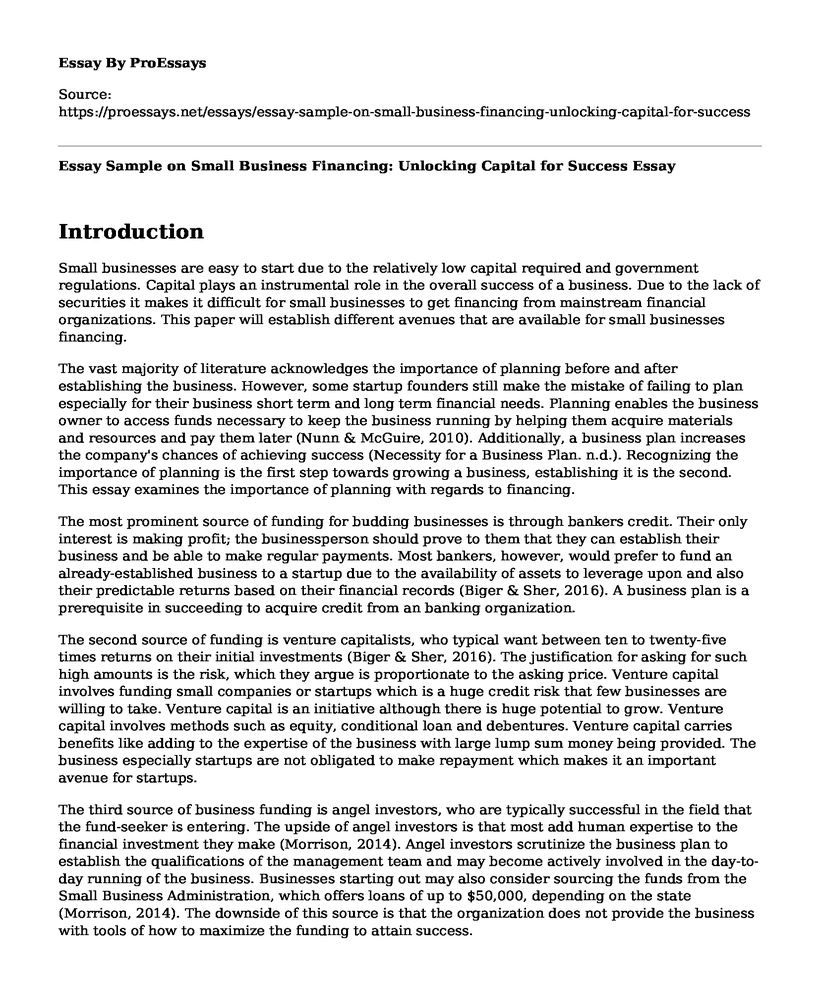Introduction
Small businesses are easy to start due to the relatively low capital required and government regulations. Capital plays an instrumental role in the overall success of a business. Due to the lack of securities it makes it difficult for small businesses to get financing from mainstream financial organizations. This paper will establish different avenues that are available for small businesses financing.
The vast majority of literature acknowledges the importance of planning before and after establishing the business. However, some startup founders still make the mistake of failing to plan especially for their business short term and long term financial needs. Planning enables the business owner to access funds necessary to keep the business running by helping them acquire materials and resources and pay them later (Nunn & McGuire, 2010). Additionally, a business plan increases the company's chances of achieving success (Necessity for a Business Plan. n.d.). Recognizing the importance of planning is the first step towards growing a business, establishing it is the second. This essay examines the importance of planning with regards to financing.
The most prominent source of funding for budding businesses is through bankers credit. Their only interest is making profit; the businessperson should prove to them that they can establish their business and be able to make regular payments. Most bankers, however, would prefer to fund an already-established business to a startup due to the availability of assets to leverage upon and also their predictable returns based on their financial records (Biger & Sher, 2016). A business plan is a prerequisite in succeeding to acquire credit from an banking organization.
The second source of funding is venture capitalists, who typical want between ten to twenty-five times returns on their initial investments (Biger & Sher, 2016). The justification for asking for such high amounts is the risk, which they argue is proportionate to the asking price. Venture capital involves funding small companies or startups which is a huge credit risk that few businesses are willing to take. Venture capital is an initiative although there is huge potential to grow. Venture capital involves methods such as equity, conditional loan and debentures. Venture capital carries benefits like adding to the expertise of the business with large lump sum money being provided. The business especially startups are not obligated to make repayment which makes it an important avenue for startups.
The third source of business funding is angel investors, who are typically successful in the field that the fund-seeker is entering. The upside of angel investors is that most add human expertise to the financial investment they make (Morrison, 2014). Angel investors scrutinize the business plan to establish the qualifications of the management team and may become actively involved in the day-to-day running of the business. Businesses starting out may also consider sourcing the funds from the Small Business Administration, which offers loans of up to $50,000, depending on the state (Morrison, 2014). The downside of this source is that the organization does not provide the business with tools of how to maximize the funding to attain success.
Conclusion
Businesses should have a plan in place to improve their chances of success. It is also their source of funding, which is difficult to acquire as a small business. Each way of seeking funding mentioned above is requires a business plan, which provides them with a realistic view of how the company intends to raise money. Venture capitalists, bankers, angel investors, and the Small Business Administration are some of the main sources of funding.
References
Biger, N., & Sher, N. (2016). New financial tools for small businesses: A commitment mechanism to secure funding. SSRN Electronic Journal. doi:10.2139/ssrn.2804614
Morrison, M. (2014). Other innovative funding sources on the rise. Banker's Guide to New Small Business Finance, 151-166. doi:10.1002/9781118853610.ch9
The Necessity for a Business Plan. (n.d.). Retrieved from https://saylordotorg.github.io/text_small-business-management-in-the-21st-century/s09-02-the-necessity-for-a-business-p.html
Nunn, L., & McGuire, B. (2010). The importance of a good business plan. Journal of Business & Economics Research (JBER), 8(2). doi:10.19030/jber.v8i2.677
Cite this page
Essay Sample on Small Business Financing: Unlocking Capital for Success. (2023, Mar 28). Retrieved from https://proessays.net/essays/essay-sample-on-small-business-financing-unlocking-capital-for-success
If you are the original author of this essay and no longer wish to have it published on the ProEssays website, please click below to request its removal:
- A Business Plan for a Breakfast Restaurant Paper Example
- Analysis of an Entrepreneur: Naomi Simson
- Essay Sample on Relevant Aspects of U.S. Law for Business
- Essay Sample on Canada and Germany Food Trade
- Essential Questions for Entrepreneurs Venturing Into a New Business
- Essay on Nike's Gender Pay Gap: Lawsuit Implications & Analysis
- Essay Example on Liberty Global: International Cable Company Serving 27M Subscribers







